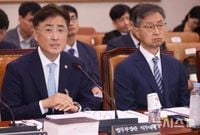On July 1, 2025, Lee Jin-soo, the newly appointed Vice Minister of Justice and Acting Minister of Justice of South Korea, publicly expressed his support for the separation of investigative and prosecutorial powers within the country's prosecution system. Speaking at a full meeting of the National Assembly's Legislation and Judiciary Committee, Lee articulated a nuanced stance that aligns with the new government's push for prosecutorial reform, signaling a significant shift in his previously held views.
During the session, Democratic Party lawmaker Park Gyun-taek questioned Lee on his position regarding the prosecution reform bill, which includes the contentious separation of investigation and prosecution duties. Lee responded cautiously, noting that it was "premature to directly approve or disapprove of the bill" at this stage. However, he affirmed his agreement with the fundamental principle behind the reform, stating, "I agree with the direction that the prosecution's work should move toward separating investigation and prosecution to ensure objectivity and fairness." This endorsement marks an important development as Lee had historically opposed curtailing prosecutorial investigative powers.
Lee's comments came amid ongoing debates over the proposed amendment to the Prosecutor's Office Act, which seeks to overhaul the criminal justice process by establishing separate agencies for investigation and prosecution. When asked by People Power Party lawmaker Park Jun-tae about endorsing the more radical elements of the bill—such as abolishing the existing Prosecutor's Office and creating a Serious Crime Investigation Agency and a Public Prosecution Office—Lee refrained from giving a direct answer, emphasizing the need for "in-depth discussion" on such a significant reorganization of national investigative bodies.
The Vice Minister also highlighted the importance of ensuring fairness throughout this process, remarking, "The restructuring of national investigative agencies is an extremely important issue, and it must proceed in a way that guarantees fairness in line with the principle of investigation-prosecution separation." This careful approach reflects the complexities and sensitivities surrounding prosecutorial reform in South Korea, where the balance of power between investigation and prosecution has long been a subject of political contention.
Lee's appointment itself was met with skepticism from certain political quarters. The Joguk Innovation Party criticized his selection, pointing to his past role as a prosecutor at the Seoul Southern District Prosecutor's Office, where he signed a statement opposing the separation of investigation and prosecution. Park Eun-jung, a lawmaker from the same party, labeled Lee a "pro-Yoon prosecutor" and a "key aide" to former President Yoon Suk-yeol and Prosecutor General Shim Woo-jung, raising concerns about potential bias and the sincerity of his reformist stance.
Yet, Lee has sought to address such apprehensions head-on. At his inauguration ceremony on June 30, 2025, he openly acknowledged the prosecution's failures, admitting that public trust in the Ministry of Justice and the prosecution remains "very low," while the demand for "change and reform is high." He candidly reflected on the prosecution's "overreach of investigative powers" and "biased investigations," which have failed to meet public expectations. "We must humbly reflect on these past mistakes," Lee said, emphasizing the need for transformation to meet the evolving demands of a specialized and advanced society.
Lee further committed to "actively communicating and discussing" the prosecution reform tasks championed by the new government, signaling his willingness to engage constructively with lawmakers and the public. During the committee meeting, he echoed this reformist sentiment by stating, "I believe there are parts within the prosecution itself that need to change before various institutional reforms proceed."
One particularly sensitive issue Lee addressed concerned the investigation of former First Lady Kim Keon-hee, who was embroiled in allegations involving the receipt of luxury bags and stock price manipulation related to Deutsch Motors. Lee, who previously served as the head of the criminal department at the Supreme Prosecutor's Office and assisted Prosecutor General Shim Woo-jung during the time of the investigation, admitted that the process had been "inappropriate." He remarked, "Such investigation procedures were not proper," acknowledging public concerns about preferential treatment during the probe.
Despite this, Lee defended the legal conclusions reached in the case. The Seoul Central District Prosecutor's Office had decided not to indict Kim, Pastor Choi Jae-young (who allegedly delivered the luxury bags), or former President Yoon Suk-yeol, citing the lack of a specific provision under the Anti-Graft Act to punish recipients of gifts related to official duties. Lee explained, "We thoroughly reviewed the relevant issues under the Anti-Graft Act and reached conclusions based on facts and legal principles." This explanation aimed to clarify that, despite procedural flaws, the substantive legal assessment was sound.
Another topic that arose during the committee hearing was the suspension of criminal trials for sitting presidents. Lee was asked about the status of former President Lee Jae-myung's criminal trial, which was halted during his presidency. Lee stated, "I understand that the trial will resume after the President completes his term." When questioned whether this suspension violates the principle of equality before the law or appears as a special favor to the public, Lee responded diplomatically, acknowledging respect for the courts' ongoing procedures and promising to "review it." Democratic Party lawmaker Jeon Hyun-hee argued that constitutional provisions mandate the suspension of all criminal prosecutions against the President, including prosecution execution, underscoring the complexity of this legal matter. Lee deferred to the courts, noting that decisions are being made considering these constitutional aspects.
Lee Jin-soo's emergence as a reform-minded figure marks a notable moment in South Korea's prosecutorial landscape. His acknowledgment of past shortcomings, combined with his expressed support for separating investigation and prosecution, suggests a potential shift toward greater transparency and fairness in the criminal justice system. However, the road ahead remains challenging, with significant institutional reforms still requiring careful deliberation and consensus-building among political stakeholders.
As South Korea grapples with these changes, Lee's role as Vice Minister of Justice and Acting Minister of Justice will be closely watched. His ability to navigate political pressures, address public skepticism, and drive meaningful reform will be critical in shaping the future of prosecution and law enforcement in the country.

